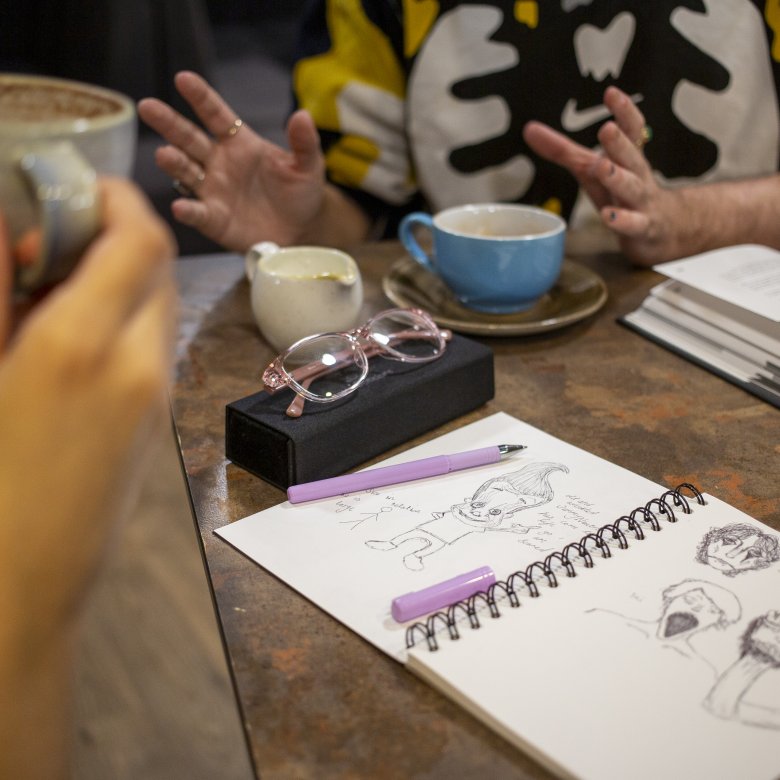How to continue your creative practice whilst away from university
30 October 2024

This article is written by second-year BA Hons Film student Mia
Whilst away from in-contact time at university, I sometimes struggled to know how to keep creating and staying inspired. Throughout my first year, I learnt some useful tips on how to stay creative over reading weeks, festive holidays and the summer break.
It's important to remember that creating content does not have to be extravagant and have a big, crowdfunded budget. Some of the best things are just thought of and instantly made with what's readily available. This can stem from writing a script or creating a storyboard to filming short videos no more than a minute long. While at university, I try to get involved in as many graduate or second-year projects as I can to build up a CV and gain experience, so that when I have breaks, I can put my skills into practice on my own, perfecting what I have learnt already.
The list below is a curation of things I do when I am in a creative block:
I try to create as many different projects as possible so that I don’t narrow my field too much, this list of ideas applies to not only one avenue of creativity.
- Get Inspired
Pinterest, YouTube, Tiktok... For me as a Film student, I also like to watch short films and create mood boards. Whatever your practice, these platforms are full of creative content and can act as a springboard for inspiration. Even if this doesn’t help to form a specific idea, it can help me to explore and assess other people's creativity, which is inspiring in itself. It always leads to me feeling more able to create, whether it is for uni and a specific module, or I have a creative spark.
- Use what you have- just make something!
For me, it just means grabbing my phone and filming on an iPhone camera. If you can’t access expensive, industry equipment, film on your phone and instead practice framing and colour grading/editing. *DaVinci is free on laptops*
This applies across all creative practices. Whether it's just grabbing a pencil, writing some words or storyboarding a project, sometimes starting is the hardest big. So just do something and see how your creativity flows from there.
- Keep it simple
Simple is better. Quality not quantity, for example, film a morning routine but make it ‘cinematic’, therefore you're honing in on specific skills of filming and making things aesthetic, not making sure a complex plot is conveyed
- Work with others (if you can)
If I want actors/models, I search social media. Or ask my friends. There is also the option to find your county’s ‘actors and filmmaking page’, or use Backstage, but specify ‘no compensation’ if there is no budget! To access these sites and pages, is as simple as just requesting access. Once accepted everyone on these pages is eager to get involved with any project, no matter how big or small. After sending out a casting call for my short film I received 3 messages for castings within an hour.
Sometimes, being around other creatives is all it needs to get a project on track and get the ideas flowing- if this helps your style of working!
5. Practice makes perfect
I always think when begin that the films don’t have to have a plot. Practice experimental or documentary. Do something you wouldn’t do at uni. This way you can practice different genres without the pressure of module grading.
You don't need to know the end point to begin!
6. Create an idea bank
If over time you keep a note of your ideas, you can create a bank to access when you're feeling a creative block, or unable to access all the facilities available whilst studying at university.
I like to write scripts and create a script bank. Then if I am unable to make the films alone, I have the scripts ready for when I get back to university. This can be something to look forward to when going back.
7. Consider renting and borrowing equipment
If you haven't got all the equipment to hand, you could look at the possibility of hiring equipment or borrowing it from someone you may know who has it.
Fat Llama’ allows you to rent equipment all over the country, with a fee ‘per day’. Although this requires a fund, you could create a crowdfunder and send it around friends and family. Donators can be labelled as executive producers or have their names in the credits.
I hope this list proves useful to those who are in a creative block or do not know how to continue their creative practices on breaks.